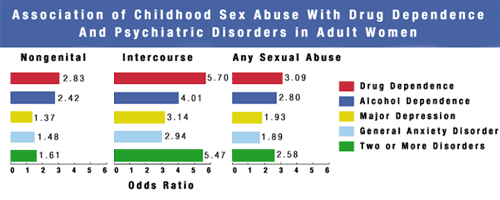Women who are sexually abused during childhood are at increased risk for drug abuse as adults, according to NIDA-supported research conducted at the Medical College of Virginia Commonwealth University in Richmond. Using data gathered from interviews of 1,411 adult twins, Dr. Kenneth Kendler and his colleagues assessed the association between three levels of childhood sex abuse (nongenital, genital, and intercourse) and six adult disorders -- major depression, generalized anxiety disorder, panic disorder, bulimia nervosa, alcohol dependence, and drug dependence. Women who experienced any type of sexual abuse in childhood were roughly three times more likely than unabused girls to report drug dependence as adults.
"Overall, childhood sexual abuse was more strongly associated with drug or alcohol dependence than with any of the psychiatric disorders," Dr. Kendler says. "Only drug and alcohol dependence were significantly associated with all levels of abuse."
 Among more than 1,400 adult females, childhood sexual abuse was associated with increased likelihood of drug dependence, alcohol dependence, and psychiatric disorders. The associations are expressed as odds ratios: for example, women who experienced nongenital sexual abuse in childhood were 2.93 times more likely to suffer drug dependence as adults than were women who were not abused.
Among more than 1,400 adult females, childhood sexual abuse was associated with increased likelihood of drug dependence, alcohol dependence, and psychiatric disorders. The associations are expressed as odds ratios: for example, women who experienced nongenital sexual abuse in childhood were 2.93 times more likely to suffer drug dependence as adults than were women who were not abused.In this study, 1,411 women born between 1934 and 1974 responded to written questionnaires that asked them if, before they reached age 16, any adult or person older than they had ever ("never," "once," or "more than once"):
- involved them in an incident that included an invitation or request to do something sexual,
- kissed or hugged them in a sexual way,
- subjected them to genital display or exposure,
- touched or fondled them in a sexual way,
- made them touch the older person or adult in a sexual way, or
- attempted intercourse.
In addition, the researchers conducted written interviews with 90 percent of the twins' parents to assess family environment and parental psychopathology. The parental interviews did not mention possible sexual abuse of the children, but did provide data on family financial status; parents' disciplinary practices, including spanking, slapping, or hitting; church attendance; and measures of harmony, discord, authoritarianism, and protectiveness.
"Controlling for family factors and parental psychopathology produced a small change in some of the associations, but the increased odds of reporting drug or alcohol dependence in adulthood after suffering sexual abuse as a child can't be explained by these background factors," Dr. Kendler says.
The women who participated in the research are part of an ongoing research investigation of female twins included in the Virginia Twin Registry, which represents a large cross-section of the population and includes data on a broad range of research topics, including psychiatric and substance abuse disorders.
"This study has particular significance because it is based on data from women in the general population," says Dr. Cora Lee Wetherington of NIDA's Division of Neuroscience and Behavioral Research. "Numerous clinical studies have documented high rates of childhood sexual abuse among women in treatment.
This study, the first to document it in a nonclinical population, is particularly important in addressing questions concerning the relationship between sexual abuse and patterns of drug abuse and addiction."
Source
- Kendler, K.S., et al. Childhood sexual abuse and adult psychiatric and substance use disorders in women: An epidemiological and co-twin control analysis. Archives of General Psychiatry 57(10):953-959, 2000.
